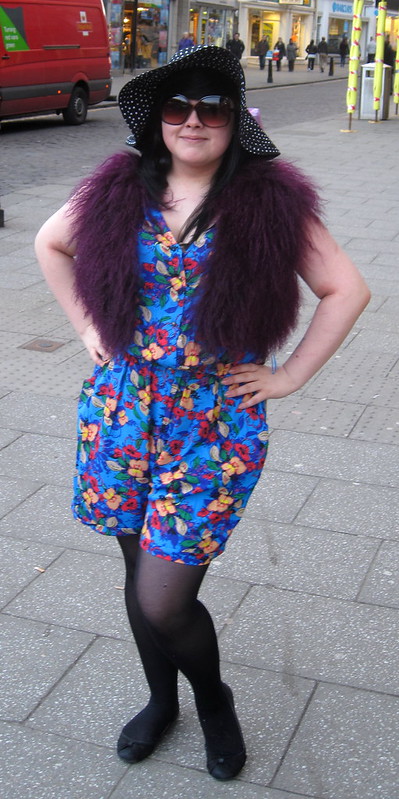Well, here’s a rare moment, me actually being in the know on a pop culture news item WHILE IT’S HAPPENING. Go, me.
Poor Wolf Blizter.
By now everyone has seen and commented on his slightly pushy conversation with the Oklahoma tornado survivor, standing in the midst of collapsed houses, playing with her toddler. We all know, by now, that reporters love natural disasters because they give them those ratings gold that few other things can provide, and Wolf Blitzer – probably an otherwise legitimately genteel and perfectly nice person – likely angled them in between some rubble, just so it could be seen on camera. Just so he could say she was blessed. Just so he could, awkwardly, ask her if she “thanked the Lord.”
Though why he asked, when it was so clearly not his business, no one knows.
To sidestep the elephant in the room. *I* believe in Divinity. I go to church(es) – sometimes with more or less cynicism than I should bring along, but I attend. I make myself part of the community of believers. I believe that matters of faith are, in large part, like matters of politics: personal, tap-roots kinds of things that determine which way one’s mental trees grow. I consider myself to be both a thinking person, and a person willing to suspend disbelief on some topics. I hope that an inquiring mind doesn’t prohibit me from having a faith (though I know that for some people, and some variations of faith, it does). I know that what Wolf Blitzer said was pushy and invasive. Why would you ask someone who hadn’t volunteered it about their religious point of view, especially on live camera? He was after something — and maybe he got it. Or, maybe he got something else entirely.
There has been a lot of fomenting and foaming about the mouth (to which I won’t link) about what Blitzer said to the woman he was interviewing. The thing is this: it’s not that big a deal, for two reasons. One, we don’t any of us have, in dot matrix print on our foreheads somewhere, the words “Christian” or “Not Christian.” I think he was, clumsily, trying to ask about her stance on faith, and I don’t know why he felt he needed to know, especially since a.) he wasn’t a friend and b.) he was there to talk about the tornado, and the woman’s narrow escape. Perhaps because she was sharing a personal vignette on national television, he decided she needed to share ALL of her personal thoughts?
The second reason I don’t think this is all that big a deal is this: the woman and the reporter are Americans. Americans talk God all the time, whether they believe in Divinity or not; it’s a weird leftover from a Puritan past. If you don’t believe this about Americans, I challenge you to live where people don’t come from a long-ago Puritan past. It makes a difference to the linguistic patterns like you wouldn’t believe. Saying “we’re blessed,” is American shorthand for lucky – and many people don’t actually believe in a Divine Blessing thing going on, but they will say, “Thank God it’s Friday,” even though, if pushed, they’d say, “what God?” This really is an American thing! In my limited experience of five years in Central Scotland, I find that British people don’t so casually invoke God (except for in profanities). So, Americans talk God, yes, they do. Culturally, folks, you have more in common with many Christian “generalists” than you might think, so maybe hold back on the urge to Other so hard?
Blitzer’s trespass was not so much that he was talking faith. The problem was not just talking – he was nosy and ham-handed and pushed. It wasn’t enough that the woman had escaped with the clothes on her back, her husband and her child, he wanted to stick his grimy fingers further into the bleeding gash in her world, and expose her guts. That is never right.
I believe in Divinity – but have many friends who are complete agnostic non-believers, atheists (which is not the same as agnostic, there’s a difference), Jewish believers, Muslim believers, and humanists. I avoid certain religious discussion with my Jewish friends – and I don’t think it matters, we share a lot of items a faith without arguing over Messiahs and the Trinity (which, I fear, isn’t particularly Biblical anyway, but let’s not Go There). I am on nodding acquaintance with the idea that there is no God but God, so my Muslim friends and I can talk in general terms, or avoid talking faith altogether. Fine. I can talk social justice with my non-organized-religious humanist friends, I can talk Pirates of Penzance or Bernstein’s Chichester Psalms with my Unitarian friends (no, seriously. My friend Jo tells me of the many great musicals she’s been a part of for her church’s musical program). I am a person who feels the importance of a lingua franca to bridge the various thought streamlets, brooks, rivers, lakes, and open water of my varying friends. I’m more of a “something-in-common” seeker than a difference underliner. I wish we all could be; it would save reporters from asking prodding, dumb questions of rattled strangers on camera.
Maybe that’s what Blitzer was doing – trying to find a “something in common” between one young mother and the rest of his viewing audience. Well, FAIL, on one level. On the other hand, if people could then gather under a similar banner of “Go Gently! Don’t Push! Speak Cautiously! Build Bridges!” well, then, we will have gotten somewhere.






